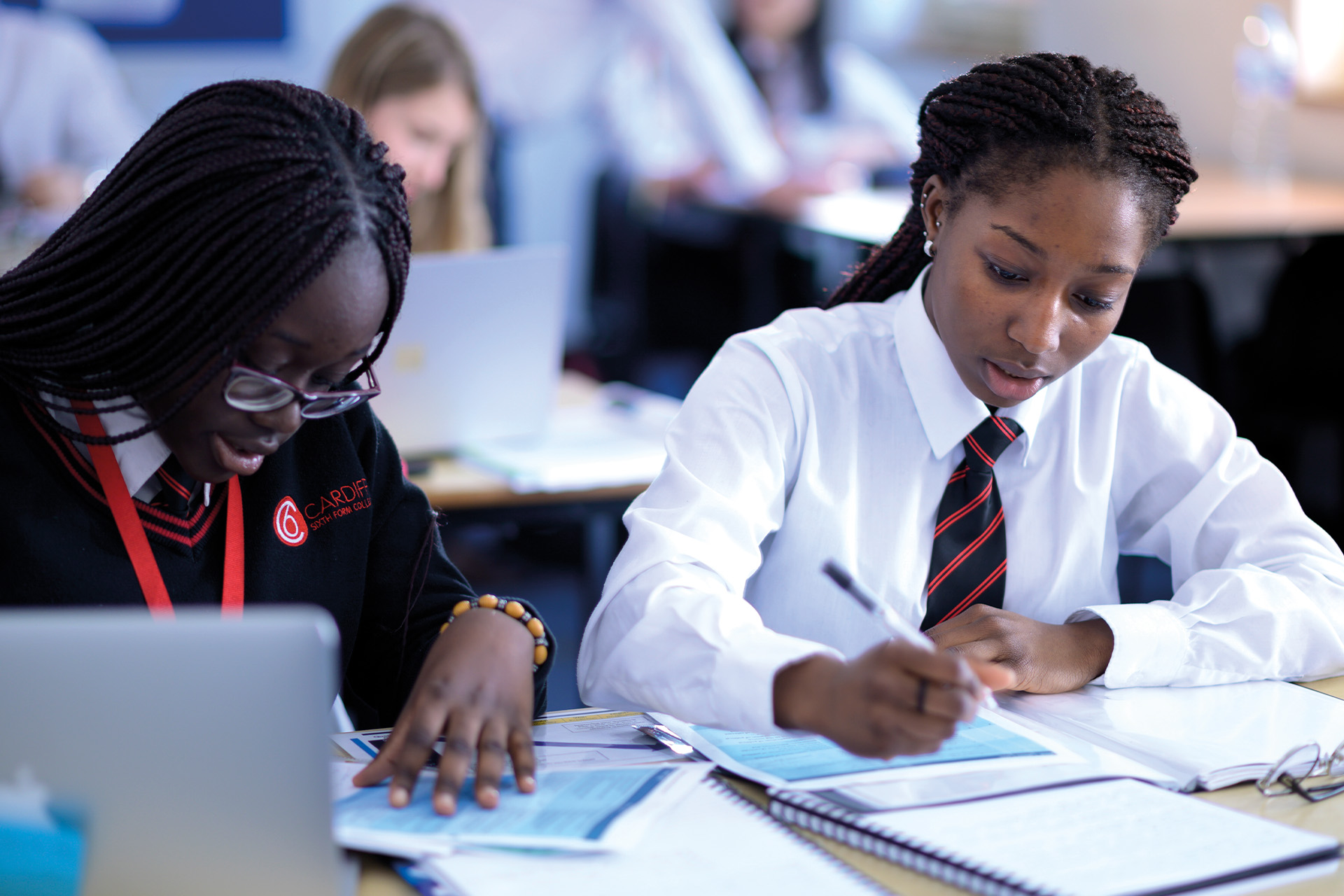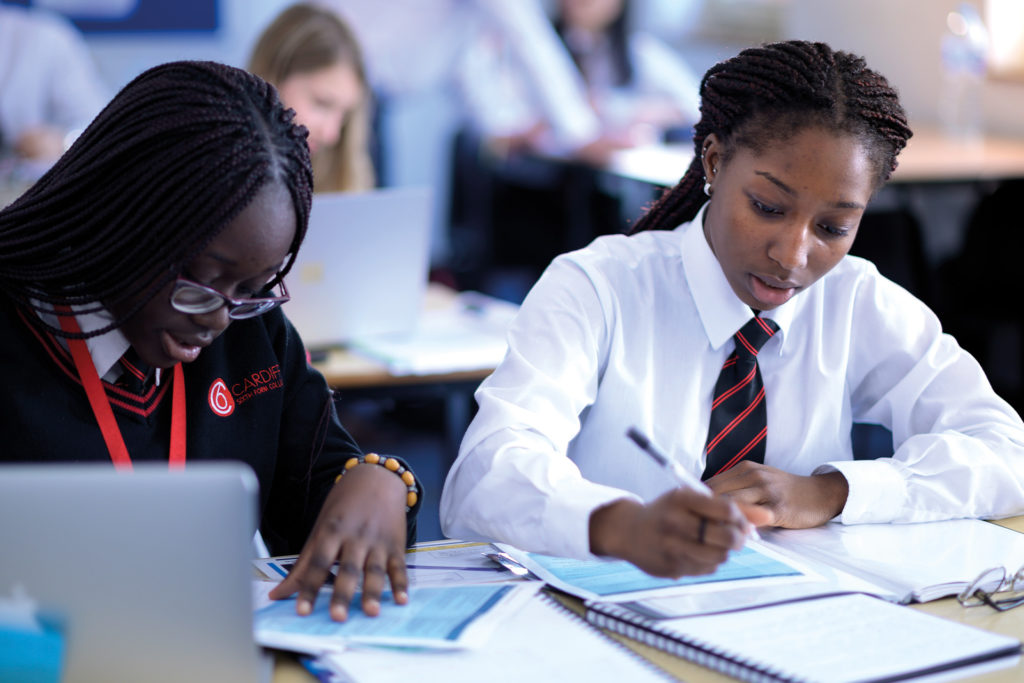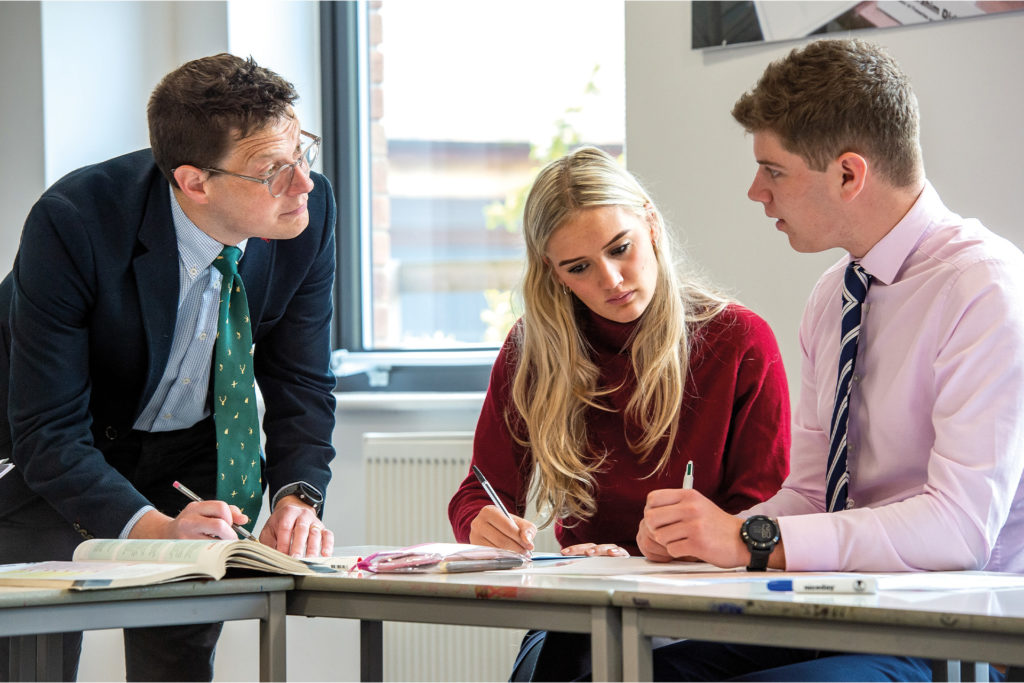Tried and Tested
By
2 years ago

Achieving the best grades at GCSE or A-level comes down to exam preparation – and parents can help, says Thea Jourdan
Exam season is approaching and young people of different ages and abilities are preparing to take tests which may help to determine their next steps. Not surprisingly, schools up and down the country focus on ensuring their pupils do their best. So what’s the latest thinking on exam preparation from schools and what can parents do to support and encourage candidates without piling on too much pressure and stress?

When it comes to high achievers, Cardiff Sixth Form College, an independent co-educational sixth form in the Welsh capital, has been at the top of the UK league tables for A-level results over the past 11 years. The College’s results are outstanding with 95 percent of A-levels graded at A* or A grade in 2022, and 99 percent at A*-B.
Tom Arrand, the school’s Head, says that practising exams ‘over and over’ has central importance. ‘Our students have no fewer than four sets of mock exams throughout a single academic year and each process is run to real examination conditions. Students reflect upon their preparation and performance in order to make incremental improvements, over time. The more they are able to practice the process, the better their revision and examination strategies become.’
He says understanding the different requirements of exams is essential if you want to do well.
‘The key here is to understand the specific requirements of the examination which differ between subjects and exam boards. The professional expertise of the teacher is, therefore, absolutely pivotal. From my own experience, having taught across all of the main exam boards, I know that what gains credit in one may not necessarily be the same in another.’
Boys and girls at Westminster School in London, which consistently gains outstanding academic results at public examinations, with 93 percent of pupils achieving A* or A at A-level in 2022, also practise exams under timed conditions. But the school doesn’t ‘teach to the test’ during the rest of the academic year. Abigail Farr, Director of Teaching and Learning, explains: ‘Our aim is for our pupils to develop a deep knowledge, understanding and love of the subject that extends beyond the exam specification. Research into cognition also suggests that if pupils understand the structure of the problem, this means that they can apply their skills more effectively to questions that they have not seen before.’
She adds that the school supports the development of independent learning skills from Year 9 upwards with plenty of opportunities to complete project work and to give independently researched talks at academic pupil-led societies. ‘So by the time the pupil comes to revise, they know how to organise their learning effectively.’
Parents have an important role to play as exams draw closer, she says. ‘It’s most helpful when parents provide positive encouragement for work at home [or work during the evenings, if the pupil is boarding]. Too much focus on outcomes can have a negative effect, as this increases the stakes and the stress on the child. A little stress supports good focus and application during the revision period, but too much impedes productive work and has a deleterious impact on mental health.’

Parents should also make sure they keep in regular contact with teachers, according to Dr Emma Margrett, Head of Radnor House Prep School in Sevenoaks, Kent. ‘A key source of information when making decisions about how to guide your child, is your child’s class teacher or subject specialist teacher,’ she explains. ‘There will be a wealth of knowledge about your child’s current level of attainment in academic subjects. They will know how your child sits within the cohort and whether their underlying ability scores suggest that they will be successful in highly competitive examination and selection processes.’

Dr Patrick Drumm, Director of Studies at Cobham Hall, an independent day and boarding school for girls aged 11-18 with a mixed sixth form, says that a pupil’s wellbeing is closely monitored in addition to supporting their academic progress. ‘A pre-requisite for a successful student is their wellbeing. As well as the usual timetabled lessons leading up to exams, additional revision classes are complemented by wellbeing lessons and there are fun and engaging Saturday enrichment activities to help students relax. Also, being the close-knit community that we are means that students and staff look out for each other.’
The school, set in 150 acres of rolling Kent countryside, focuses on developing key habits that help students navigate their way through this tough period in their lives. ‘Attributes such as stamina, organisation and adaptability are nurtured in the classroom and beyond through our Saturday Enrichment Programme,’ says Mr Drumm. ‘To ensure that students are also rounded and grounded, a wide range of co-curricular activities and service opportunities takes them out of their comfort zone and challenges them in different ways.’

Revision is an art in itself. Megan Fairley, Head of Upper School at Oakham School, said: ‘Whatever techniques you use, revision, like learning in the first place, needs to be active, not passive. Retrieval is hugely important, so revisiting the same material several times across the revision period and in different ways is important. If you are making flashcards of key terms on Monday, you should be testing yourself on Thursday, and then practising some exam questions using these terms the week after. I tell our students to think of revision like painting with colour – the more strokes you make, the stronger the colour.’
Leo Dudin, Deputy Head Academic at Oakham, adds: ‘Each term pupils formally reflect on their experiences, which facilitates their learning, and helps teachers and tutors to provide support and challenge where it helps.
‘Our staff and pupils are optimistic and hopeful which are the key elements of a successful learning community. They have clear guidance regarding the processes to follow, have the scope to shape how they approach those processes, and they appreciate that there are many different pathways to success.’

In the Upper School, pupils can choose between A-levels, BTECs and the International Baccalaureate Diploma Programme (IBDP).
Parents should be careful to balance pushing a child to work hard and supporting them, according to Anita Cleare, writer, coach and founder of the Positive Parenting Project. ‘It is a very delicate balancing act between supporting a child and pushing them too hard when it comes to revision. Every child is different and it is important to take an individual approach. Some children don’t need pushing at all but others may need structuring and purpose. Others may be highly anxious and stressed and need regular breaks and moments to unwind.’
She points out that younger children may not have developed learning skills, but older teenagers doing exams may already have good study processes including dividing revision into manageable chunks and taking breaks with frequent self testing to check on progress.
‘Spending a whole day studying is daunting but if you do half an hour on one topic and then some time on another, with breaks in between, the time can fly by.’
Should you take children away on holiday over the Easter holiday? Anita Cleare says that it depends: ‘The job of the parent is to provide a suitable learning environment so children can study and revise. That’s harder to do if you take the whole family on an adventure packed holiday at Easter, like skiing or going to Disney World for example. These types of holidays provide lots of distraction and make it doubly hard to sit down and look at books and study. But a visit to see grandparents in a familiar place may be fine.’
Movement is really good for studying – even in small bursts, she says. ‘I suggest getting outside as often as possible and exercising, not least because it helps improve sleep and sleep boosts memory. Anxiety is natural before exams and a small amount of anxiety can help put us in the right place to perform well in a task.’ She adds, ‘But we still need to manage anxiety because too much can lead to panic, and this makes people less effective. Breathing exercises, meditation and mindfulness can all help pupils relax and focus on the now.’

The better prepared a child, the less likely they are to feel overwhelmed. Many children now receive extra tutoring to help them achieve their personal best in exams. Lucy Cawkwell-Osborne, director of Osborne Cawkwell Tuition based in London, says that tuition, if needed, should start long before an exam is looming, ‘We would advise a student start as early as they can if they are struggling in a subject – even at the start of the academic year if that’s deemed appropriate.
‘It’s all about gradually building blocks of knowledge, so the student can properly understand, absorb and then be able to use what they are learning. If a child is doing well, we often see families book a block of hours over the Easter holidays when a child can pinpoint the few areas they don’t understand. It all depends on the child and what they need.’
She advises a ‘steady revision plan spread over as much time as possible will give children the time they need to do well. Over the Easter holidays, we see students do six to eight hours a day – which, if structured well (with breaks, a mixture of activities and subjects) can be very productive.’
And revision aids and work books, often written by examiners themselves, are useful for those candidates who want more structure.
Paul Cherry, Publishing Director, UK Curriculum, at Hodder Education, says that revision aids help to bring structure to revising and contain structured practice and past-paper style questions, often with modelled answers and commentaries from examiners. ‘They offer deep understanding of the assessment requirements, be that awareness of the command words – sometimes with specific meaning by Board – or understanding of what the assessor is working to get the student to demonstrate.
‘What they do not do is offer “exam crammer” solutions using their understanding of any live assessment. Examiners in a position to see live assessments cannot write revision materials for us.’
Sarah Collins, an 11+ expert and Galore Park author, says that younger children, taking the 11+ may find workbooks and revision aids particularly useful. ‘Since there is little time for 11+ preparation in school hours, the onus falls on parents to support their children through this work. Consequently, having reliable resources to help them understand these very different tests is key to building children’s ability and confidence.’
Whereas GCSEs are designed to test pupil’s knowledge and understanding, the 11+ focuses on their thinking skills. ‘This is why verbal, non-verbal and spatial reasoning tests are often included since these are looking at aptitude rather an ability to retain knowledge,’ says Collins. ‘These tests can be likened to crosswords in that although they are not something you can be taught to do, familiarity and practice improves your speed and success.’
The night before a test, it’s important to rest and take stock. ‘I would advise getting a good night’s sleep the night before an exam as opposed to studying all night,’ says Anita Cleare. ‘On the day, review note cards (but not outside the exam hall) and eat a good breakfast.’
Parents can help by ensuring a child knows it’s not all about exam results.
‘By definition, not every child can get top grades but they need to know that whatever happens, it is only one exam,’ says Cleare. ‘It’s not the be all and end all that will define their whole life. People do fail exams and bounce back. Do your absolute best but it won’t define you and if it does go wrong on the day, there is always a way to move forward.’
See the schools online listings: Oakham School, Radnor House Prep School, Cobham Hall and Westminster School



